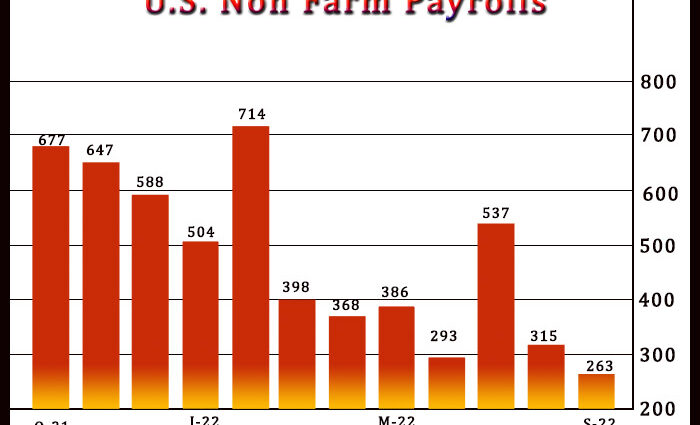The Labor Department released its closely watched monthly jobs report on Friday, showing U.S. job growth slowed in the month of September but still came in slightly stronger than economists had anticipated.
The report showed non-farm payroll employment jumped by 263,000 jobs in September after surging by an unrevised 315,000 jobs in August and spiking by an upwardly revised 537,000 jobs in July. Economists had expected employment to leap by 250,000 jobs.
The slightly stronger than expected job growth reflected notable increases in employment in the leisure and hospitality and healthcare sectors, which added 83,000 jobs and 75,400 jobs, respectively.
Economists noted the job growth was even stronger excluding a drop in state and local government education payrolls, which reflected shifting seasonal patterns in teacher hiring.
The Labor Department also said the unemployment rate dipped to 3.5 percent in September from 3.7 percent in August, while economists expected the unemployment rate to come in unchanged.
The unemployment rate matched its lowest level since just before Covid-19 lockdowns began to take effect in February of 2020, which was also matched in July. Unemployment has not been lower in over fifty years.
“The drop in the unemployment rate back to a cycle low underscores that the labor market remains extremely tight,” said Kathy Bostjancic, Chief U.S. Economist at Oxford Economics. “The Fed will view the jobs report as a reason to continue its aggressive pace of tightening.”
The unexpected drop in the unemployment rate came as the labor force shrank by 57,000 people, while the household survey measure of employment increased by 204,000.
The report also showed average hourly earnings rose by $0.10 or 0.3 percent to $32.46 in September. The annual rate of wage growth slowed to 5.0 percent in September from 5.2 percent in August.
“Looking ahead, we expect a more marked moderation in job growth in the fourth quarter followed by outright job losses by 2023 Q2 as the economy enters a recession in response to sharply higher interest rates and weaker corporate profits,” said Bostjancic.
She added, “Softer labor market conditions should translate into slower wage growth and ease inflationary pressures, allowing the Fed to eventually take a pause from hiking interest rates in 2023.”
Source: Read Full Article
-
TikTok Banned On Devices Issued By U.S. House Of Representatives
-
The Countries With the Most Nuclear Accidents
-
International tech company relocates its headquarters to Westminster, bolstering Colorado’s “very strong” tech sector
-
United Airlines Offers 5% Pay Hike To Pilots Ahead Of Schedule
-
Fiscal deficit in FY24 may be capped at 5.9%, says Goldman Sachs

